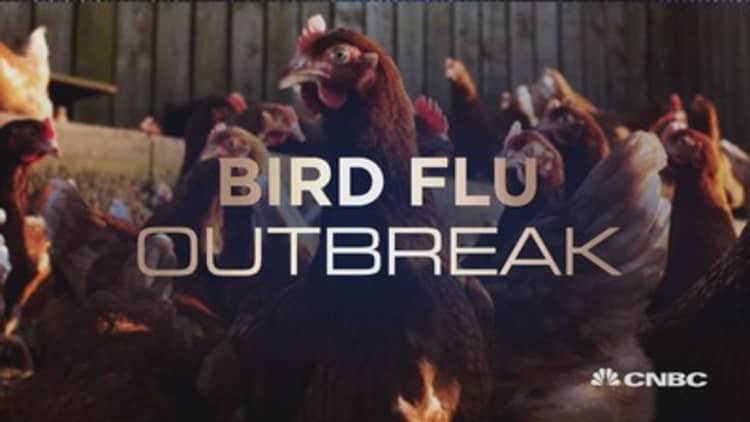
The worst animal virus outbreak in U.S. history has killed 48 million birds, yet no humans have been infected. Still, a medical officer in the Centers for Disease Control's (CDC) Influenza Division says the department is "concerned" that the bird flu virus may mutate.
"These are the first of these types of viruses that we're seeing," Dr. Michael Jhung tells CNBC in an interview with "On The Money."
He added: "Because [the viruses are] new, we're a little concerned because we don't know how dangerous they could be."
Read MoreUS: Bird flu vaccine not good enough for outbreak
Although there hasn't been any new bird flu cases since mid-June, USDA officials are preparing for a possible return of the virus this fall.
Today, the CDC considers the risk of infection to the general public as low. However, the agency is advising people to stay away from sick or dying birds. If it is necessary, Jhung said, wear coveralls, face masks and eye protection.
Cooler weather and wild bird migration could bring a recurrence of the disease, according to experts. The two states hardest hit by the outbreak were Iowa and its egg-laying chickens, and Minnesota's turkey population.
Watching and waiting carefullly
Thus far, the biggest casualty of the outbreak has been the effect on food inflation, namely higher egg prices.
According to market research firm Urner Barry, Midwest wholesale egg prices have risen by a wallet-busting 135 percent, from $1.19 on April 22 to $2.80 per dozen more recently. Some analysts are predicting the price of a dozen eggs could climb as high as $6.00.
Read MoreEgg prices breaking all-time highs on bird flu
The CDC 's Jhung says they are "looking very closing at the virus to see if it has traits that could cause severe disease."
While Jhung stressed "this bird flu outbreak in the United States is not the start of a pandemic," he did tell CNBC that the agency is "preparing for human cases of infection with this bird flu virus, even though there have been none.
"We don't want to see any, but we are getting ready in case there are cases of human infection," he added.
The concern is that a flu strain could make the jump from animals to humans, which is rare but within the realm of the possible. According to the World Health Organization (WHO), most avian flu varieties cannot infect humans, yet some strains--such as A(H5N1) and A(H7N9)--have caused "serious disease" in people.
Jhung says officials are "looking at the virus itself to see if it has any traits that might make it cause more severe disease in people, or could be more easily transmittable." Just as seasonal flu viruses change in "little ways" during the flu season, other flu viruses can change in "big ways," he said.
There is one thing Jhung was able to rule out: bird flu virus cannot be transmitted through food. "There's no evidence to suggest you can get bird flu from eating properly cooked poultry or eggs," he said.
If a bird or person is infected with two different kinds of flu virus, sometimes genetic material could be swapped and "create a brand new virus with certain traits" that could be "more easily transmissible to people," Jhung said, which could easily become a pandemic.
He explained that "if that happens, we could be in quite a different situation than what we're seeing right now."
In the event bird flu cases do show up in the human population, Jhung says work on a possible vaccine is underway. "Vaccination would be one of the strategies that we could employ."
Vaccination is under development, but poultry producers are divided over whether to use vaccines on bird stocks. Earlier this year, CDC officials said they were researching a human variety, just in case.
Jhung explained the CDC has "identified some viruses that could be used…..found good candidates and are holding them in a bank to see if they're needed." He said they'll be sent to manufacturers to make vaccines, "if that looks like what we'll need."
--On the Money airs on CNBC Sundays at 7:30 pm, or check listings for airtimes in local markets.





